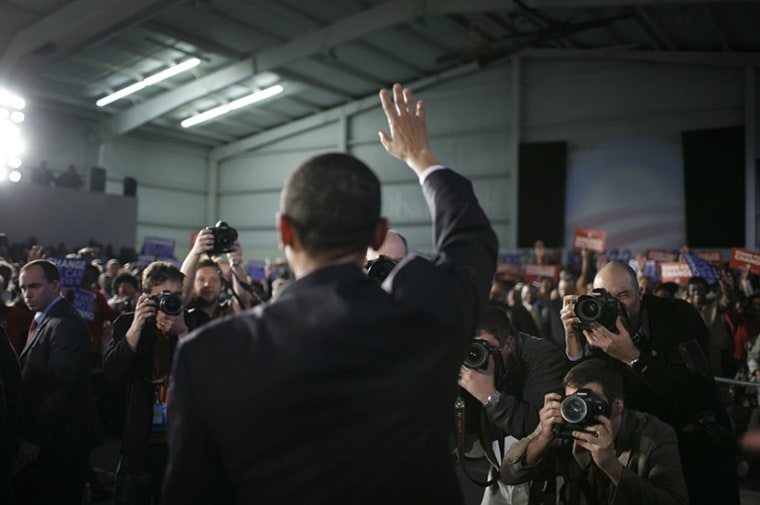“It has been and remains the Department’s policy that members of the news media will not be subject to prosecution based solely on newsgathering activities.”
--“Report on Review of News Media Policies,” U.S. Justice department, July 12.
Some of us can remember when it was the Justice Department’s policy not to prosecute members of the news media based even partly on newsgathering activities, which were assumed to be protected by the First Amendment. This wasn’t codified in law or in regulation; it was just deemed a matter of common sense. So the Justice Department’s new guidelines about when and how it may frisk the news media matters a lot less than what Justice’s actual intentions are.
The occasion for the new guidelines is a recent flurry of leak investigations. In one, concerning an Associated Press story about a failed al-Qaeda plot, Justice helped itself to two months’ worth of secretly subpoenaed phone records on 20 separate phone lines for people who worked at the AP. In another, concerning a Fox News story about an imminent nuclear test in North Korea, Justice obtained emails from reporter James Rosen. Although Rosen hasn’t been prosecuted, his alleged source, a former intelligence analyst named Stephen Kim, has been indicted, and Rosen himself is named in an FBI affidavit as an “aider, abettor, and/or co-conspirator.” In a third instance, the Justice department is reportedly investigating Gen. James Cartwright, former vice chairman of the Joint Chiefs of Staff, for leaking information about how Israel and the U.S. jointly loosed the Stuxnet computer virus on Iran’s nuclear facilities. (No subpoenas are known to have been obtained against The New York Times.)
The new Justice rules do include some small improvements. Under current policy, any consideration of subpoenaing members of the press must be preceded by negotiations with the press, provided that the attorney general (who must approve all such subpoenas) can establish that such negotiations wouldn’t jeopardize the investigation. Under the new policy, the burden of proof for bypassing negotiations shifts to establishing that such negotiations would jeopardize the investigation. At least in theory, that should mean more negotiations with editors and reporters before subpoenas are issued.
Currently, under the 1980 Privacy Protection Act's “suspect exception” loophole, the government may search and seize materials that a reporter intends to disseminate if there’s “probable cause” to think the reporter is in receipt of certain “information relating to the national defense, classified information, or restricted data.” That’s a blank check to harass national security reporters. Under the new guidelines, such search and seizure will occur only if the reporter is already under criminal investigation for conduct “not connected to ordinary newsgathering activities.” The Justice Department also reaffirmed its support (and the president’s) of a media shield law that would establish new procedures for advance judicial review of all subpoenas issued to news organizations.
But new rules about leak investigations wouldn’t be necessary if the old rules were obeyed.
For example, the obvious spirit of any law called the “Privacy Protection Act” is to, um, protect the press’ privacy. (The law, which was largely drafted by the Carter Justice Department, was passed to reverse a 1978 Supreme Court ruling allowing a police search of the Stanford Daily.) Appreciation for this priority appears to have dimmed.
The spirit of the Espionage Act of 1917, legal experts tend to agree, is redolent of the xenophobic hysteria that accompanied U.S. entry into World War I. Consequently, until fairly recently, government prosecutors were wary of using it to punish government employees who leak information to the press. Indeed, America managed to get through two world wars, the Korean war, the Vietnam war, and the invasion of Grenada without successfully prosecuting any government leakers under the Espionage Act. That ended with the 1985 conviction of Samuel Loring Morison, who when President Bill Clinton pardoned him in 2001 could still be called (by The New York Times’s Anthony Lewis) “the only government official ever convicted for giving classified information to the press.” (Morison, an intensely hawkish Navy intelligence official, had sent satellite photo of Soviet ships to Jane’s Defence Weekly, where he was seeking a job.)
Writing in the New Yorker in April about yet another case (involving the Obama Justice Department’s prosecution of a CIA officer named John Kiriakou, who allegedly gave ABC News classified information about the CIA’s “enhanced interrogation” of al-Qaeda suspects), Steve Coll observed that during the past century, fully six of only 10 U.S. prosecutions against government officials alleged to have leaked government secrets occurred under President Obama and Attorney General Eric Holder. Does Obama really want to be remembered as the most vindictive enforcer of government secrecy in 100 years?
Clearly, the problem wasn’t with the Justice Department’s previous rules about media investigations, most of which dated back to 1972. Approached in the right spirit, they proved reasonably sufficient for a pretty long time. The problem is whether whatever rules the Justice Department maintains are enforced sensibly. Stricter prohibitions against interfering with press freedoms are welcome, but if the Obama administration continues to make leak investigations a higher-than-warranted priority the new protections won’t be worth much.
